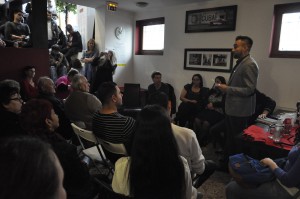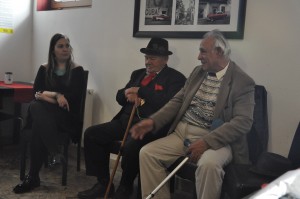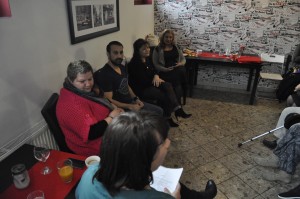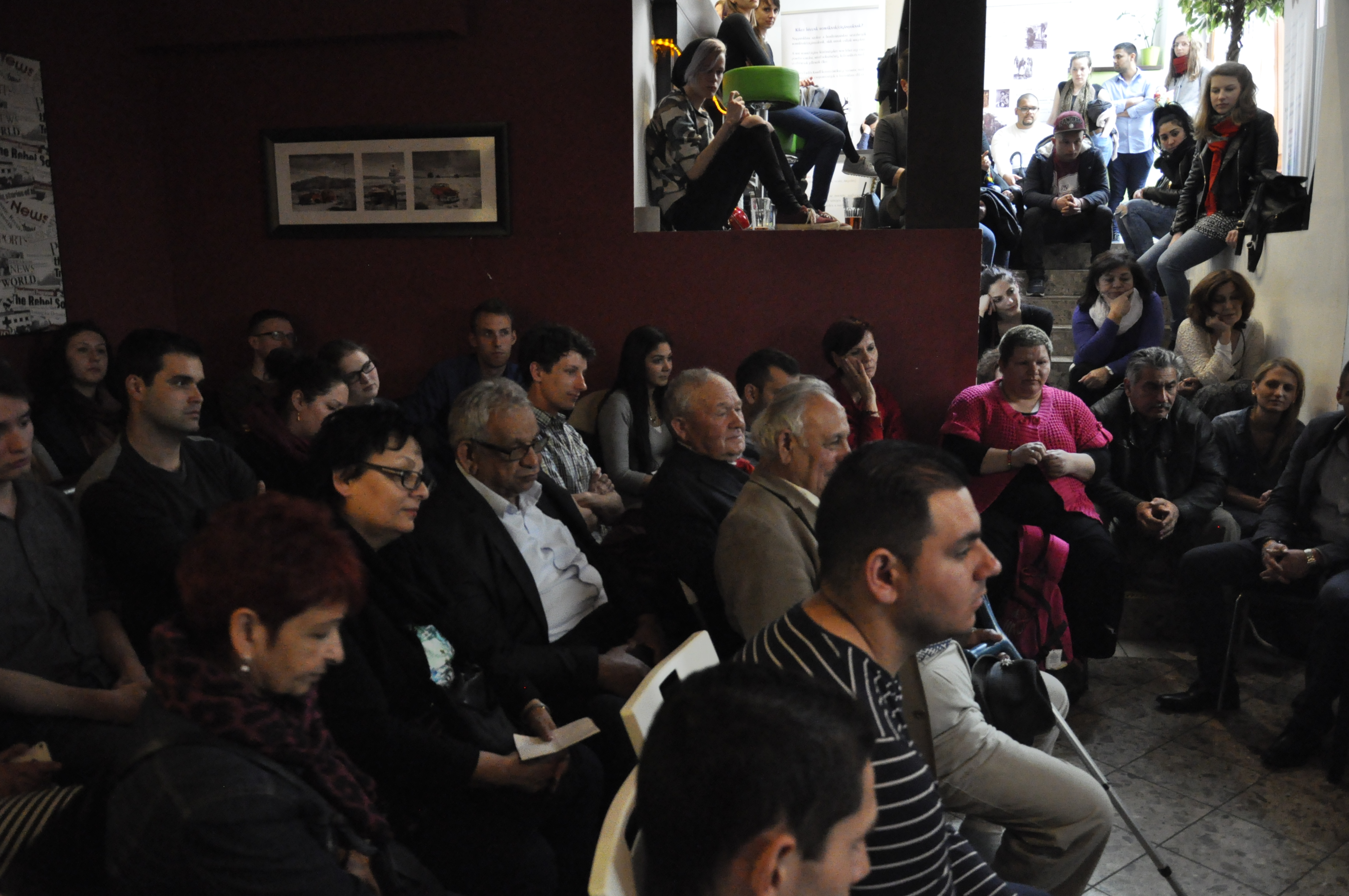2017. április 7-én az EVZ Alapítvány támogatásával, Pécsett Roma napi kulturális rendezvény került megrendezésre a „Mashkar Kelihot – Közösségek Között” elnevezésű roma – zsidó programon belül. A rendezvény célja a nemzetközi Roma Világnap színessé tételével egy több témát feldolgozó eseménysorozat megrendezése volt. Az idei évben fontos volt, hogy a beszélgetések felhívják a figyelmet a kisebbségek elleni gyűlöletbeszédre, a holokauszt szélesebb körben való megismertetésére, illetve a romák által megált interszekcionalitásra.
Utóbbi téma fontossága azért vitathatatlan, mert erősödő és egyre nyíltabb, mégis kevésszer tárgyalt jelenségre hívja fel a figyelmet. Azok a kisebbségek, akik a többségi társadalom tagjaitól identitásukban többszörös különbséggel többes hátrányt érzékelnek, és ami miatt inkluziójuk erősítése a közösségen belül még indokoltabb. A program előkészítése több találkozót vett igénybe a program önkénteseivel, akikkel a prioritások meghatározását követően a mindenki által vállalt feladatok kibontása és szervezése volt. A rendezvényen 160 fő vett részt, romák és nem romák. Az eseményt a Facebookon illetve a város nyilvános hirdető falain plakátok népszerűsítették. Az egynapos program során létrejött a holokauszt szakértői kerekasztal beszélgetés, amelyet Dr. Beck Zoltán, a PTE-BTK NTI Romológia és Nevelésszociológia Tanszék adjunktusa moderált.
A kerekasztal beszélgetésben részt vevő szakértők voltak: 
- Dr. Lakatos Szilvia – PTE- BTK NTI Romológia NevelésszociológiaTanszék adjunktus
- Dr. Heindl Péter -történelemtanár, jogász
- Jakab Natália – Gandhi Gimnázium és Kollégium történelem és cigány- népismeret tanár
A második kerekasztal beszélgetés a roma holokauszt-túlélőkkel történt, a beszélgetést Kékesi Alexandra, az UNIV Pécs újság szerkesztője moderálta. A kerekasztalban beszélgető túlélők:
- Forgács József (Zalaegerszeg)
- Kőszegi Lajos (Pécs)

A harmadik kerekasztal beszélgetés témája a nemi szerepek a roma közösségeken belül, a beszélgetést Kiss Tibor Noé szerkesztő moderálta. A kerekasztal beszélgetésben résztvevő szakértől:
- Boros Juliana – PTE-BTK Társadalmi tanulmányok tanszék, tanársegéd
- Máté Dezső – MTA Kisebbségkutató Intézet, tudományos munkatárs
- Pápai Renáta – szociális munkás, LGBTQI aktivista
- Várnai Anna – Színes Gyöngyök Roma Nőkért Egyesület, elnök
- Nótár Ilona – kulturális antropológus, teológus

A képzőművészeti rész beemelésével, a kiállításon keresztül a roma kulturális értékek közvetítése, megismertetése a romákkal és a többségi társadalom tagjaival további sikeres elemnek bizonyult. Ráczné Kalányos Gyöngyi festőművész olajfestményei alkották a kiállítást. A kiállítást Kőhalmi Krisztina művelődéstörténész nyitotta meg. Az eseményt követően a pécsi Kóstolda roma lakásétterem prezentálta a hagyományos roma gasztronómia kincseit egy bőséges vacsora feltálalával. A Roma napi rendezvénysorozatot a táncház zárta. A zenét a Chache Rom hagyományőrző együttes szolgáltatta, a táncot Istvándi Judit koreográfus – tánctanár tanította be. A rendezvény megvalósításához a helyszínt a Wannabe LGBTQI kávézó szolgáltatta.
*
On the 7th of April 2017 we held a public event on the International Roma Day (8 April) in Pécs, supported by the EVZ Foundation as part of a Roma-Jewish project called Mashkar Kehilot – Between Communities. The goal of the event was to colour the International Roma Day with a series of events and covering different topics related to other minorities as well. This year, it was important for us that the discussions raise awareness of hate speech against minorities, importance of remembering the Holocaust and all the communities who were victims, and experiences related to intersectionality, facing multiple discrimination.
The last topic mentioned is undoubtedly crucial, because even though it is getting more visible and open, we don’t discuss about it very often. Those minorities whose identities differ from the mainstream society in many ways, experience multiple disadvantages, and therefore their inclusion is even more valid. This program’s preparation required multiple meetings with the participants, first we set our priorities and then they worked on the tasks and responsibilities they took on regarding the organisation of the event. The event had 160 Roma and non-Roma guests. It was advertised on Facebook and on posters in the city. During this one-day long event, there was a panel discussion organised moderated by Dr. Zoltán Beck, the adjunct of the Department of Romology and Sociology of Education of the University of Pécs about the remembrance and education of the Holocaust and the Roma Genocide.
The experts who participated in the panel discussion were the following:
-
Dr. Szilvia Lakatos– adjunct of the Department of Romology and Sociology of Education of the University of Pécs
-
Dr. Péter Heindl – History teacher, legal expert, leading past research group of students in Gilvánfa
-
Natália Jakab – Gandhi High School, History and Romology teacher
The second panel discussion with survivors of the Roma Genocide was moderated by Alexandra Kékesi, the editor of the “UNIV Pécs” newspaper. The survivors participated the panel:
-
József Forgács (Zalaegerszeg)
-
Lajos Kőszegi (Pécs)
The topic of the third panel discussion was: gender roles in the Roma community, it was moderated by Tibor Noé Kiss, editor. The experts participated the panel:
-
Juliana Boros – University of Pécs, Social Studies department, assistant lecturer
-
Dezső Máté– Hungarian Academy of Sciences Institute of Minority Research, expert
-
Renáta Pápai – social worker, LGBTQI activist
-
Anna Várnai – Színes Gyöngyök Association for Roma Women
-
Ilona Nótár –mcultural anthropologist, theologian
On the exhibition, we introduced the Roma culture and values to the Roma and non-Roma guests which appeared to be a big success, just as the previous parts of the event. The oil paintings of the exhibition were made by Györgyi Kalányos Ráczné artist and Kriszta Kőhalmi, art historian gave the opening speech. At the end of the program, there was a feast prepared by the Kóstolda Roma home-restaurant in Pécs, we ate traditional Roma dinner. At the end of the event, there was a Roma dance with live music which was provided by Chache Rom, a traditional Roma band, the choreography was taught by Judit Istvándi choreographer and dance instructor. The venue was provided by Wannabe LGBTQI coffeehouse.
Buzás-Hábel Géza


